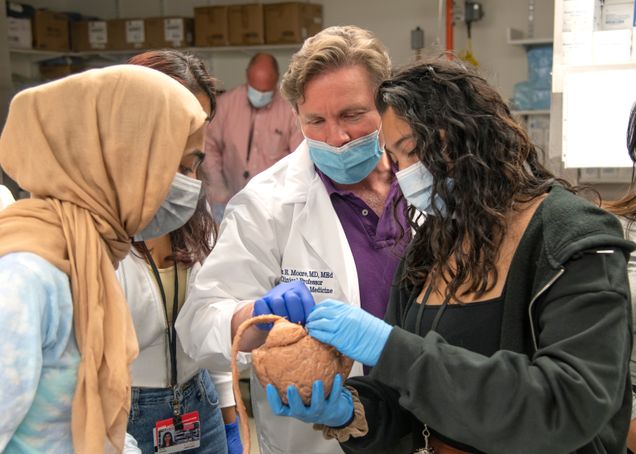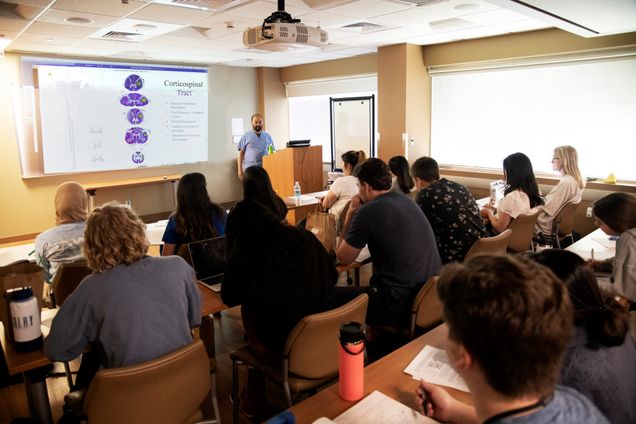Summer Program in Neuroscience is Back
 Brian Moore, MD, clinical professor, pathology and laboratory medicine, assists SPIN students in examining a human brain.
Brian Moore, MD, clinical professor, pathology and laboratory medicine, assists SPIN students in examining a human brain.
When COVID-19 hit Massachusetts in spring 2020, the shutdown of businesses and social life left people feeling anxious and isolated, including in the medical community where labs were closed or access severely restricted, and even critical teaching access to Boston Medical Center (BMC) by medical students ceased for a time as the medical industry went into survival mode.
“We’re all fatigued by (the pandemic) and the isolation it imposed on us. It really wore folk down, and I think most of us are hungry to interact with others in real life,” said James Holsapple, MD, chair of neurosurgery and associate professor of neurosurgery and pediatrics.
Now that widespread vaccinations and other public health measures have reduced the risk of COVID-related illnesses, many restrictions have been relaxed or dropped. Holsapple is especially cheered by the return of the Summer Program in Neuroscience (SPIN), which had been suspended for the past two years, as a sign of the reemergence of a more convivial academic world.
“I was really worried that the flame would kind of go out and we’d have trouble restarting it,” said Holsapple. He collaborated with other faculty and physicians at BUSM and BMC who wanted to share their passion for exploring and healing the human brain to establish SPIN in 2017.
Seventeen undergraduates are now on the Medical Campus, participating in the eight-week program. They do research in neuroscience labs, attend lectures, review cases with physicians, sit in on patient consultations and observe neurosurgical procedures.
 Jonathan Wisco, PhD, associate professor of anatomy and neurobiology, delivers a lecture to undergraduates enrolled in the Summer Program in Neuroscience (SPIN). The eight week program reopened this summer for the first time since 2019, before COVID-19 restrictions.
Jonathan Wisco, PhD, associate professor of anatomy and neurobiology, delivers a lecture to undergraduates enrolled in the Summer Program in Neuroscience (SPIN). The eight week program reopened this summer for the first time since 2019, before COVID-19 restrictions.
Student enrollment in SPIN is limited by lab availability and by the number of faculty and surgeons who volunteer to teach in the program, Holsapple said. The break during the pandemic didn’t dim enthusiasm for the program on the part of students and mentors. In 2017, 50 students applied for 10 positions. This year’s class of 17 were selected from more than 160 applicants.
Holsapple said he had no trouble finding mentors.
“It’s completely volunteer; nobody, myself included, is getting paid to do this,” he said. “They’re just people who feel this is important.”
The students pay $4,000 for tuition, mostly to defray lab expenses costs. Applicants are mainly college sophomores and juniors, but the program does not intend to recruit them into a medical profession, said Holsapple. Instead, SPIN gives talented students a window into how medical professionals, particularly those in the clinical neurosciences, think, work and live.
“It’s a really positive thing to know that you are able to intervene at a crucial decision-making point in the students’ lives and show them things that are useful in terms of thinking about those decisions,” said Holsapple.
It’s a process he’s familiar with from his own life experience. Forty years ago, medical school was considered the ultimate destination for the best and brightest science undergrads. Graduating as a physics major with honors from Drake University in 1980, Holsapple entered the University of Kansas School of Medicine, then found himself questioning that decision.
“No one asked me questions like ‘Why do you want to be a doctor, or what do you think a doctor is, or what things have you done along the way to discover whether medicine is a good place for you to be?’” he recalled.
In search of an answer, he took a job as a nurse’s aide. Emptying bedpans, assisting with patient feeding and personal cleanliness were not typical duties for a medical student, but Holsapple found it grounded him in the reality of patient care. He then took a year off to work as a fellow under renowned neuropathologist John Kepes, MD, professor emeritus of pathology at the University of Kansas. He assisted on autopsies, examined brain specimens, becoming progressively fascinated by neuroscience.
Holsapple sees SPIN as that kind of experiential opportunity, one that may or may not lead to a science or medical career but is life-enriching.
“You might become a neurosurgeon, but you can’t know until you’ve had some experience and this is an opportunity to see whether you’re interested at all, or maybe you will just use it another way,” he said.
But it’s also, Holsapple feels, an enriching experience for SPIN mentors, particularly given the negativity surrounding the recent politicization of science and medicine.
“They (students) want to be there. They want to learn,” he said. “And we want to be there. We want to share.”
View all posts